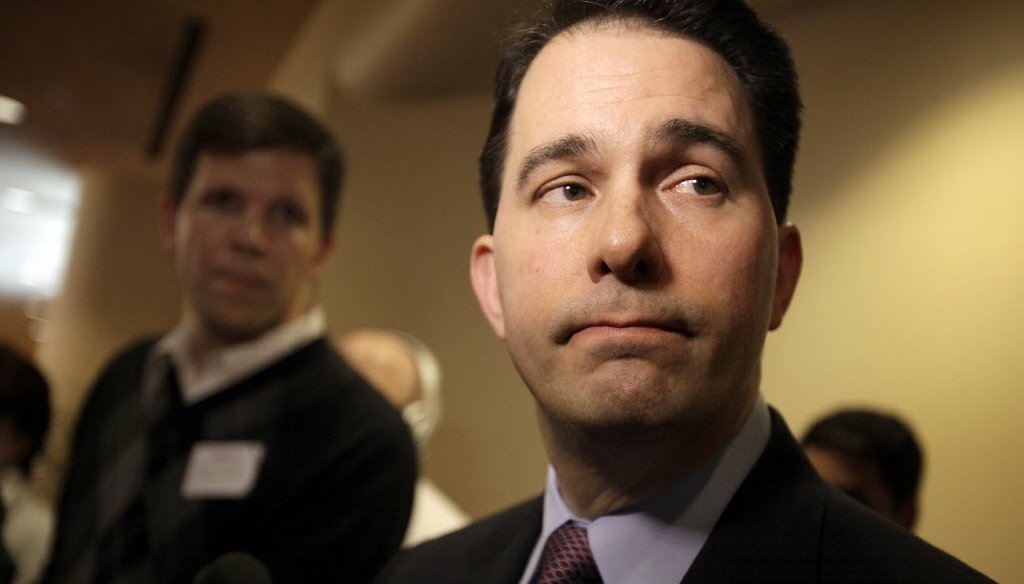Stand up for the facts!
Our only agenda is to publish the truth so you can be an informed participant in democracy.
We need your help.
I would like to contribute

Some advocates of expanding Medicaid say it would create jobs, but Gov. Scott Walker has rejected the proposal.
Gov. Scott Walker announced Feb. 13, 2013 that he would reject an expansion of Medicaid offered as part of Obamacare, saying he has a better idea for getting more people health insurance.
Democrats fumed, imploring the Republican governor to take the money -- full federal funding being offered for three years under President Barack Obama’s health care reform law to make more people eligible for Medicaid, the state-federal health insurance program for the very poor.
The debate about Medicaid expansion has centered on how best to provide health coverage for more people, with Walker opting to put more low-income adults into a federal marketplace, where they could buy private health insurance, starting in 2014.
But there have also been claims about whether states would spur job growth if they expand Medicaid.
The day after Walker’s announcement, Robert Kraig, executive director of Milwaukee-based Citizen Action of Wisconsin, which says it works to "advance progressive values and shape the public and political debate around health care, economic development and consumer protection," told Wisconsin Public Radio that the Medicaid expansion would create 10,000 jobs in Wisconsin.
"Well, if you cover a lot more people, then you also, obviously, have increased jobs in the health care sector and so, this is investing in Wisconsin's health economy, which is a big part of our economy," he claimed.
Kraig said an analysis his organization did with Families USA -- a liberal group that pushed for Obamacare -- estimated that about 10,500 additional jobs would be created as a net effect of the Medicaid expansion, and that another analysis put the figure at 10,000 jobs.
So, if Walker flip-flops -- as GOP Florida Gov. Rick Scott did on the Medicaid expansion -- would jobs proliferate?
Health care is a complicated field and projections can be difficult to fact check. But, leaving the Truth-O-Meter aside, PolitiFact Florida examined research and shed some on the question in an articleposted Feb. 27, 2013.
Experts weigh in
Here are six things our colleague Amy Sherman found:
1. Experts said some predictions about previous Medicaid expansions in Maine and Arizona ended up not being accurate. For example, uncompensated charity care increased, which undermines the argument that when hospitals get reimbursed for more patients, they will be able to hire more staff.
2. Harvard University health economics professor Katherine Baicker argued that boosting health care jobs should not be a policy goal for health care reform because salaries for health care jobs "are not manufactured out of thin air -- they are produced by someone paying higher taxes, a patient paying more for health care, or an employee taking home lower wages because higher health insurance premiums are deducted from his or her paycheck."
3. Linda Quick, president of the South Florida Hospital and Healthcare Association, predicted a gradual net increase in health care jobs as more people seek health care.
4. Michael Tanner, a senior fellow who researches health care topics at the libertarian Cato Institute, said: "I hesitate to say it will create no new jobs, but I’m suspicious of studies that say it will create ‘x’ new jobs on the other side. There are so many moving parts, and we don’t know how it will play out."
5. University of Chicago economist Casey B. Mulligan argued that increasing Medicaid will reduce employment because people will no longer need to work full-time to get health insurance.
6. Chris Lafakis, a senior economist at Moody’s, said that if all states opted into the expansion (and they haven’t), the country would add 270,000 jobs over 10 years.
In summary
Overall, PolitiFact Florida found:
• Higher coverage rates will encourage those who would otherwise not have insurance to visit doctors, boosting health care demand. Higher coverage rates will result in hospitals getting paid for more patients, allowing hospitals to hire and invest.
• The federal government spending additional money in states that expand Medicaid would lead to more jobs being created.
But, Lafakis, the Moody’s economist, said that even without Obamacare, the health care sector was growing "gangbusters" due to an aging population.
So, it may be complicated in the future to parse out job growth numbers and determine to what extent they are a result of the Medicaid expansion or other factors.
Our Sources
Milwaukee Journal Sentinel, "Walker rejects full Medicaid expansion, says 224,000 more to be covered," Feb. 13, 2013
Wisconsin Public Radio, Robert Kraig interview, Feb. 14, 2013
PolitiFact Florida, "Will a Medicaid expansion create jobs? A review of the evidence," Feb. 27, 2013


























